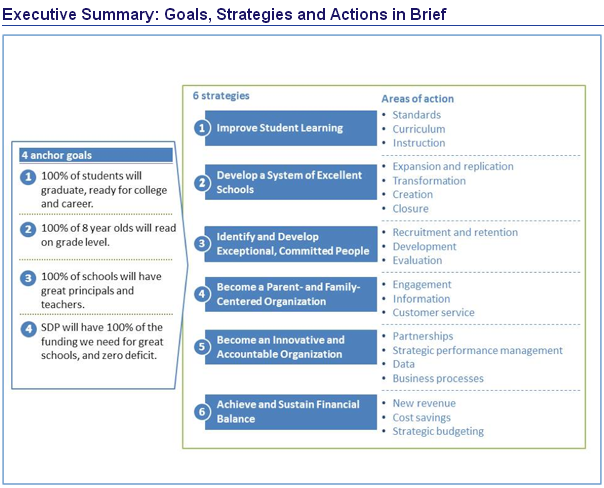What Makes the Philadelphia School District's New Action Plan World Class
With the release last month of the Philadelphia School District's Action Plan (v2.0), Superintendent Dr. William Hite and other District leaders have charted an updated course for K-12 education. There’s little question that improving outcomes for the nearly 200,000 students the District serves is one of the most pressing challenges facing the city and the region at large. And, it’s no secret that the District can't do it alone -- progress is going to require a joint effort between school administrators and staff, government officials, and business and civic leaders. Therefore, it is encouraging to see the close alignment between the Action Plan's four "anchor goals" and the shared agenda for K-12 education developed last year by cross-sector leaders as part of the World Class Greater Philadelphia initiative.
ACTION PLAN GOAL 1: 100 percent of students will graduate, ready for college and career.
It will come as no surprise that the District’s primary goal is to ensure that all of its students graduate ready for college and career. The World Class K-12 agenda is built around a virtually identical vision for the region. In Philadelphia, there is much to be done to achieve this goal: although graduation rates vary considerably by school type and student demographics, on average, only 64 percent of students in the District finish on time. Although this figure has improved in recent years, it is still well below the national average of 78 percent and lags far behind neighboring suburban counties -- for example, close to 95 percent of students in Montgomery, Bucks and Chester graduate in four years.
ACTION PLAN GOAL 2: 100 percent of 8 year-olds will read on grade level.
Research has shown that youth who aren’t reading on grade level by the end of third grade too often remain behind – largely because this is the age when students make the transition from “learning to read” to “reading to learn.” Given the critical nature of this stage of learning, 3rd grade reading scores will be one of the key indicators used to track progress around the World Class agenda. Last year, only 45 percent of 3rd graders were rated proficient or advanced on state exams. Recognizing that this number needs to increase significantly, Philadelphia recently signed on to the national “Campaign for Grade-Level Reading” with the explict goal of developing and implementing citywide strategies to double the number of students proficient in reading at the end of third grade by 2020.
ACTION PLAN GOAL 3: 100 percent of schools will have great teachers and principals.
Improving teacher effectiveness and school leadership was the top K-12 strategy identified in the World Class Education & Talent Development agenda. For the District, attracting and retaining top talent is the primary way to achieve its ambitious vision. The rollout of a new teacher and principal effectiveness system this year will provide District leaders and staff with valuable feedback that can be used to tailor professional development and ultimately improve performance. The District will also continue to partner with a number of innovative local training programs, such as the recently launched Philly Plus and the Philadelphia Teacher Residency.
ACTION PLAN GOAL 4: The District will have 100 percent of the funding we need for great schools, and zero deficit.
Significantly advancing the strategies in Action Plan 2.0 or the World Class K-12 agenda will be next to impossible without adequate resources. The financial troubles facing the District have been front and center in recent years as state funding has diminished and schools have been forced to operate with drastically reduced staff and central administrative support. While recent concessions made by the principals union will save the District $20 million over the next three years and efforts to raise local revenues may yield some dividends, to fundamentally change the game over the long term will require altering the way the state allocates school funding. Currently, a growing coalition of individuals and organizations is joining with Superintendent Hite and Mayor Nutter to advocate for a student-weighted funding formula in Harrisburg.
The Action Plan’s alignment with the World Class agenda extends beyond these anchor goals and into the details of the plan -- in early literacy, parent and family involvement, strengthening connections between education and careers, and beyond.

Partnering for Progress
Perhaps the most promising alignment between the Action Plan and the World Class agenda lies in not the “what” but the “how.” The District has indicated a commitment to “form new and cultivate existing partnerships with philanthropic, business, non-profit, higher education and community organizations and others” to advance the steps laid out in the Action Plan. This emerging work is being managed through the District’s Office of Strategic Partnerships under the leadership of Stacy Holland – co-founder and former executive director of the nationally recognized Philadelphia Youth Network and a member of the team of experts who helped to develop the World Class Education & Talent Development agenda.
It’s clear that addressing challenges as substantial and complex as those facing Philadelphia public schools is going to require close collaboration between the District and the many organizations and regional leaders already working to improve K-12 outcomes in the city. A shared agenda will be critical to success, so it’s encouraging that the approach being taken by District leaders aligns so clearly with the shared business and civic agenda being advanced as part of the World Class initiative.